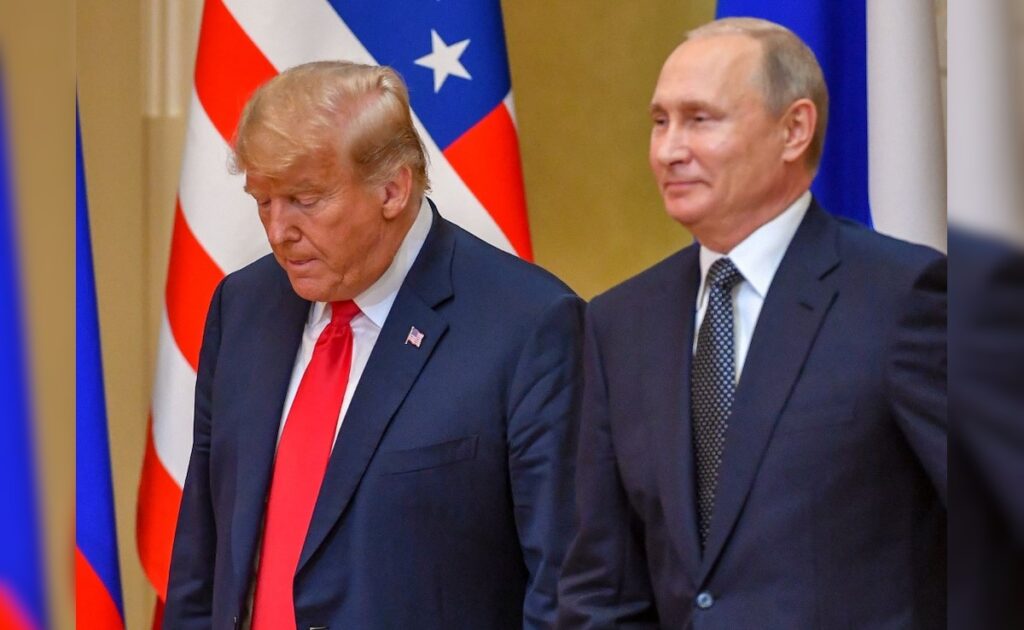
Russian President Vladimir Putin stated on Thursday that he is open to talks with US President-elect Donald Trump “anytime,” following Trump’s claim that he could secure a peace deal for Ukraine shortly after taking office.
Trump, who will return to the White House in January, has raised concerns in Kyiv that he might pressure Ukraine to accept peace terms favorable to Moscow.
During his annual end-of-year press conference, Putin said Russian troops have the upper hand on the battlefield but admitted uncertainty regarding when Russia would reclaim the western Kursk region, which Ukrainian forces had entered in August.
The press conference, a long-standing tradition in Russia, serves as both a televised event and a rare opportunity for Putin to address uncomfortable questions directly.
When asked about Trump’s proposals for a potential peace agreement, Putin expressed a willingness to meet with the incoming Republican president.
“I don’t know when I’ll see him. He hasn’t said anything about it. I haven’t spoken with him in more than four years. But I’m ready, of course. Anytime,” Putin remarked. He added, “If we meet with President-elect Trump, I’m sure we’ll have a lot to discuss,” emphasizing that Russia is open to “negotiations and compromises.”
Putin also welcomed Trump’s criticism of President Joe Biden’s decision to allow Kyiv to use US-supplied missiles to strike Russian territory, marking a significant escalation in the ongoing conflict.
Russian forces have been advancing in eastern Ukraine, with Putin frequently highlighting their battlefield successes. “We are progressing towards our primary goals set at the beginning of the special military operation,” he said, referring to the conflict. “Our troops are fighting heroically, and the capabilities of our forces are growing.”
In November, Russia’s military made its fastest progress in eastern Ukraine since the beginning of its 2022 invasion.
When asked by a woman from the Kursk region about the return of residents to their homes after evacuations due to the Ukrainian assault, Putin acknowledged that he could not provide a timeline. “We will absolutely drive them out. But the exact date, I’m sorry, I cannot say at the moment,” he admitted.
Putin, 72, was also questioned about Russia’s economic challenges, stemming from increased military spending and significant labor shortages due to the ongoing conflict. He insisted that the situation remained “stable despite external threats,” citing low unemployment and industrial growth.
Regarding inflation, Putin described it as “a worrying signal,” acknowledging price increases in basic goods such as butter and meat. He also pointed to Western sanctions as a contributing factor, though he downplayed their significance, and criticized the central bank for not taking more aggressive measures to combat inflation.
In response to a question about Russia’s new hypersonic missile, Oreshnik, Putin appeared to threaten a strike on Kyiv. “Let them set up air defenses in Kyiv, and we will launch an Oreshnik strike to see what happens,” he proposed, highlighting the missile’s ability to evade air defense systems.
Putin also addressed the assassination of senior Russian army general Igor Kirillov, calling it an act of terrorism. Kirillov, head of Russia’s chemical weapons unit, was killed by a bomb planted in a scooter outside a residential block in Moscow, marking one of the boldest attacks attributed to Kyiv since the conflict began.
In response to questions about Syria, Putin rejected the notion that the downfall of former President Bashar al-Assad represented a “defeat” for Russia. “You want to present what is happening in Syria as a defeat for Russia, but I assure you it is not… we have achieved our goals,” he asserted, noting that he had not yet met with Assad, who sought refuge in Moscow as rebel forces advanced on Damascus, but planned to do so soon.
